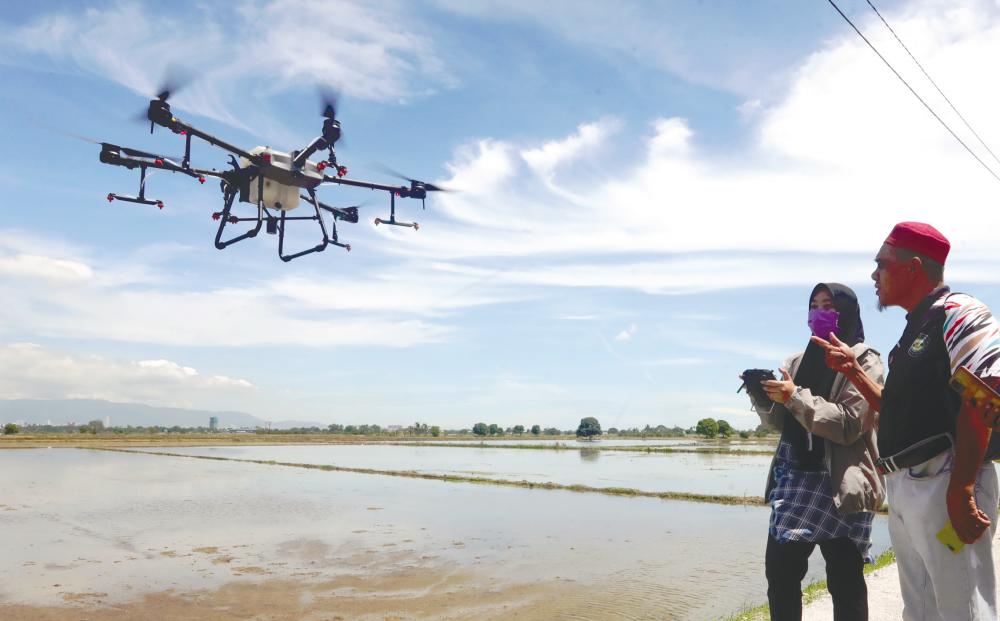PETALING JAYA: The implementation of drone technology has demonstrated considerable advantages in sectors such as agriculture, asset management and security surveillance, said Malaysian Research Accelerator for Technology and Innovation (Mranti) CEO Datuk Rais Hussin, adding that agriculture stands out as a sector in which drone technology has proven successful.
“Drones equipped with advanced imaging sensors and data analytics capabilities are used for crop monitoring, precision farming and yield optimisation.
“By providing real-time insights into crop health, irrigation needs and pest infestations, drones contribute to more efficient and sustainable agricultural practices. This ultimately boosts productivity and reduces resource usage.”
He said in addition to agriculture, drone technology has found success in the surveillance and security sector.
“Drones equipped with high-resolution cameras and thermal imaging are utilised for border patrol, event security and disaster response.
“These unmanned aerial vehicles provide dynamic and cost-effective solutions for monitoring large areas, improving situational awareness and enabling swift response to security incidents.
“It is effective in supporting authorities with real-time information for enhanced decision-making and resource deployment.”
Rais said Mranti has a comprehensive roadmap, called the Malaysia Drone Technology Action Plan 2022-2030 (MDTAP30), that aims to foster growth of drone technology in Malaysia.
“To address the challenges faced by the agriculture sector, Mranti aims to provide scalable drone solutions. These are tailored to alleviate labour shortage and enhance productivity.
“Mranti is also committed to leveraging drone technology to support security and rescue forces during emergencies and disasters.”
He also said MDTAP30 is anticipated to make significant economic contributions.
“The plan foresees a substantial boost to gross domestic product, projecting an infusion of RM50.71 billion by 2030.
“The initiative also aims to create 100,000 high-value jobs, aligning with broader goals of economic prosperity, job creation and talent development.”
Rais said despite its advantages in several sectors, limitations on widespread adoption and the challenges of operating drones commercially are still apparent.
“As drones are still considered as an emerging technology and industry, there are several factors that need to be taken into consideration.
“Cost factors, technological advancements and integration challenges contribute to the complexities of implementing drone technology,” he said, adding that safety was a crucial aspect as drones operate within aviation space.
“One of the key challenges lies in the potential for collisions with other aircraft.
This poses a risk to both manned and unmanned vehicles.
“Untrained operators may lack the necessary skills to navigate drones safely, leading to incidents that compromise public safety.
“Additionally, the misuse of drones for unauthorised activities in areas with large gatherings or critical infrastructure also raises security concerns.”
He said Mranti was establishing a nationwide Unmanned Traffic Management system that addresses the need for a structured and well-managed drone ecosystem.
“This lays the groundwork for a regulatory framework, ensuring the safe and organised operation of drones throughout Malaysia.”
Rais also said regulatory bodies such as the Civil Aviation Authority of Malaysia (CAAM) are pivotal in establishing and enforcing guidelines that promote responsible drone usage.
“Similar to owning a car, drone operators must also register their unmanned aerial vehicles under CAAM.
“Drone operators need to go through certified training programmes. This ensures they acquire the necessary skills and knowledge to operate drones safely and in compliance with aviation regulations.
“As Malaysia aims to position itself as a global leader in drone technology, addressing these challenges will be crucial to realising the full potential of drone technology and its positive impact on the country’s various sectors,” Rais said.
Malaysia currently has over 110,000 drones registered with CAAM.









